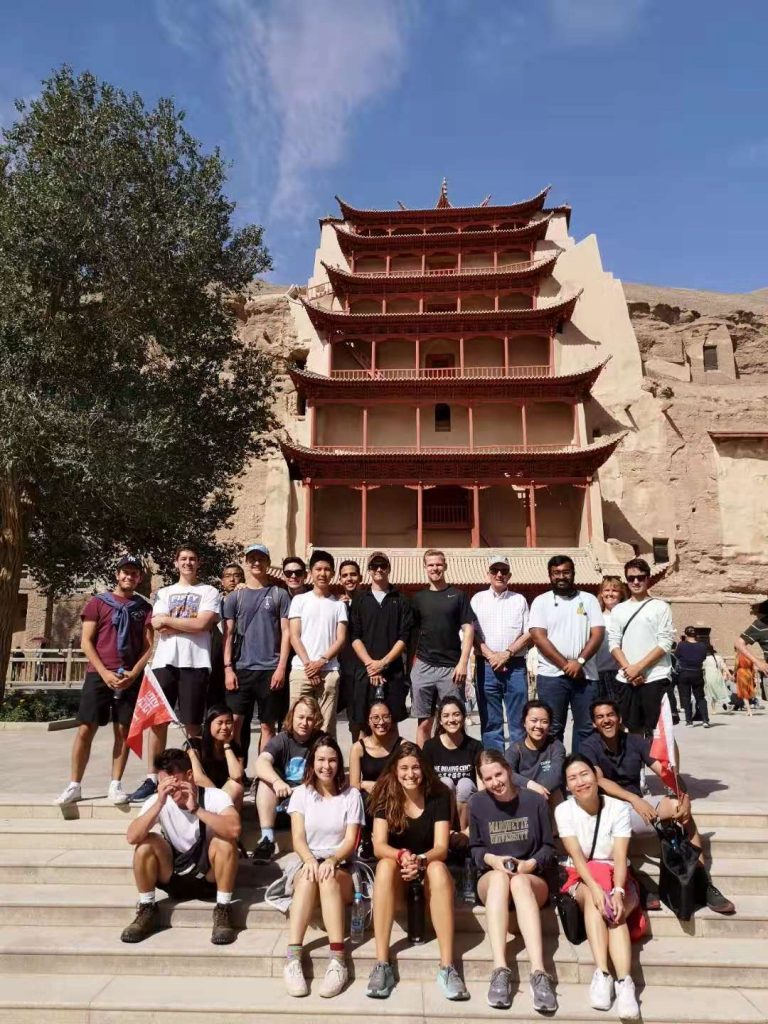
Advice to An Incoming TBC Student
By Connor B., Gonzaga University, TBC Fall 2019 Semester Study Abroad Student
Coming into this semester with The Beijing Center, I had a thousand questions about what to expect in China. I was lucky to be friends with a former TBC student, but I understand that not every incoming student has someone who can answer their questions. I thought it would be helpful to synthesize my experience here in China, into several key points of advice that I would give to any incoming TBC student. Here’s my attempt at doing so.
1. Make friends with the Chinese roommates, even if they’re not your roommate
My Chinese roommate, Ansel, has been an amazing addition to my study abroad experience. He’s helped me find my bearings in China, showed me how to complete day-to-day tasks (i.e. ordering food, taking the subway), shared deep conversations with me, showed me less apparent sides of Chinese culture, and become a close friend.
Not every TBC student will have a Chinese roommate. Regardless, this shouldn’t stop you from reaching out to them. They are a valuable resource for your adjustment to China and can become great friends. It’s not uncommon for Ansel to hang out with other students in TBC, share meals, or go dancing with them on the weekends.
Despite having my own Chinese roommate, I’ve become close friends with two other Chinese roommates (Quark and Steven). We’ve developed plenty of inside jokes, played our fair share of Mario Kart and Smash Bros, and explored Beijing on the weekends. Also, Quark and I even traveled together across China during Golden Week! True immersion requires integrating yourself into your study abroad location and forming relationships with the locals. If you don’t make an effort to befriend the Chinese roommates, you’re missing out on a wonderful opportunity.
2. Don’t worry about all the details
You might be stressing about leaving your family and friends for a whole semester. Valid. But I might be the first to tell you that you shouldn’t be stressing about the smaller details regarding your life in China. I remember researching phone plans, worrying about obtaining exit and entries for my visa, and trying to find banks in China before my departure. TBC staff will hold your hand during the first week abroad and prepare you for your life in Beijing. They’ll set up your phone plan, show you restaurants, provide you with a meal card/subway card, lead you through several orientations, etc.
The helpfulness of the TBC staff doesn’t have to stop after orientation week. I’ve utilized the help of TBC staff often throughout the semester. They’ve answered my questions, helped me plan activities, suggested travel locations, assisted me in completing internship paperwork, and much more. If you’re worried about the “smaller” details, I encourage you to reach out to TBC staff (it’ll save you a lot of time and stress!).
3. You’ll find a community if you look for one
One of my biggest worries coming into this semester was whether I’d find a community of friends during my time abroad. I’m not sure if I just got lucky or if it’s in the nature of students who choose to push against the grain and come to China, because I’ve become close friends with a goofy group of students through TBC. I am pleased to say that we’ve developed a tight community, one that I am finding difficulty in saying goodbye to, as I prepare to go home at the end of this semester. The Silk Road was a wonderful way for us to become comfortable with one another, and since then, we’ve always hung out on the weekends and coordinated events together. From eating too much shawarma (shoutout to the guys near West Gate) to crazy nights in the city, we’ve shared a lot of laughs.
Unfortunately, I can’t guarantee that you’ll find a loving community so easily in your fellow TBC students. However, finding a community isn’t limited to just TBC students. There are thousands of students at this campus, many of whom are international students. UIBE occasionally hosts social events and has many clubs, meaning that there are opportunities to meet students outside of your study abroad program. TBC students who have internships will be able to get to know their co-workers and potentially develop friendships. Also, the Chinese roommates (as mentioned before) and your Chinese tutor are “built-in friends” to your study abroad experience. If you look for a community, you’ll find it.
4. If you want an internship in China, start looking now.
The opportunity to intern in a foreign country is one that you shouldn’t pass upon. For any student interested in pursuing an internship in Beijing, I highly encourage you to start looking as early as you can. My case is unique because the US Embassy requires you to apply months before you start to pass your security clearance. I found out this information after expressing an interest in interning with the Embassy, to TBC. If I hadn’t reached out, I probably would have missed the deadline to apply.
Most internships won’t require you to apply months in advance. However, it’s important to know what you want coming into this semester and to touch base with your potential employers as early as you can. Some of my friends applied for internships during their first weeks in China. Many were successful, but a fair share of them were ignored by their potential employers.
To get your foot in the door, do some research on internships in the Beijing area a month or two before coming to China. TBC has a long list of internship sites where former students interned at, and are more than willing to answer any of your questions. It’s possible to find an internship once you arrive in China, but for your benefit and convenience (considering how crazy busy your first month in China will be), I recommend you act sooner rather than later.
5. Not knowing any Chinese is OK, but you should learn some while you’re in China.
I’m one of those students who didn’t know a lick of Chinese before arriving to Beijing. I didn’t stress out about the language barrier until the two ladies sitting next to me on my flight over, were bombarding me with questions in Chinese. That’s when it hit me: I don’t speak Chinese!
For the first few weeks, I relied on Google translate, hand gestures, and my roommate to communicate with Chinese nationals. I quickly adapted to Chinese (thanks to my intensive Chinese course) and now I am confident enough in my language skills to operate on my own. If you’re lost or need immediate help, there are plenty of English speakers around China (look for younger people!). One thing that surprised me was how many signs and restaurant menus are actually in English.
Regardless, of whether you have competence in Chinese or not, you’re going to have a lot of awkward moments. People are generally understanding and patient, but I’ve had several people yell at me in frustration because I didn’t understand them. No matter what, it’s going to be fine. Embrace the uncomfortable!
6. Journal.
If you haven’t realized it already, you’re about to embark on perhaps the biggest adventure of your life thus far. You will travel, have lively weekends, be challenged, learn a lot, share deep conversations, and constantly encounter new experiences. Life as a study abroad student is busy and fast-paced. Sometimes, it is important to take a moment to slow down and reflect.
Since the day before I left for China, I’ve consistently kept a journal. It’s been a way for me to facilitate self-reflection, record my thoughts/reactions, and write down all the stories that I’ve accumulated. Looking back on some of my older journal entries, I’m able to chart my growth over this semester. Moving forward, I know that I will value having a detailed journal when I look back on my abroad experience.
Well, that’s all the advice that I have for now. There’s much more to share, but I think you’ll figure it out as you go. For more pressing questions, I can’t stress enough to reach out to TBC staff. Good luck and enjoy your semester. Take advantage of your time in China, it’ll move faster than you think.











